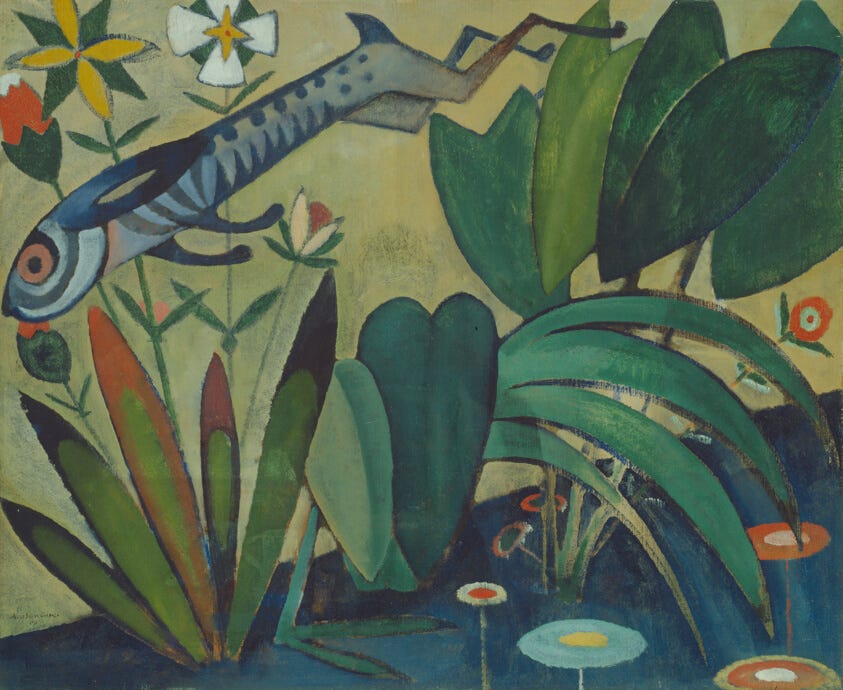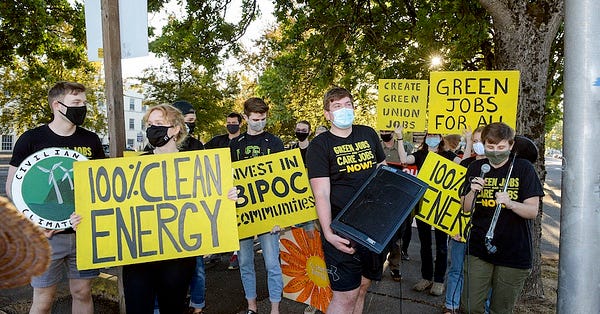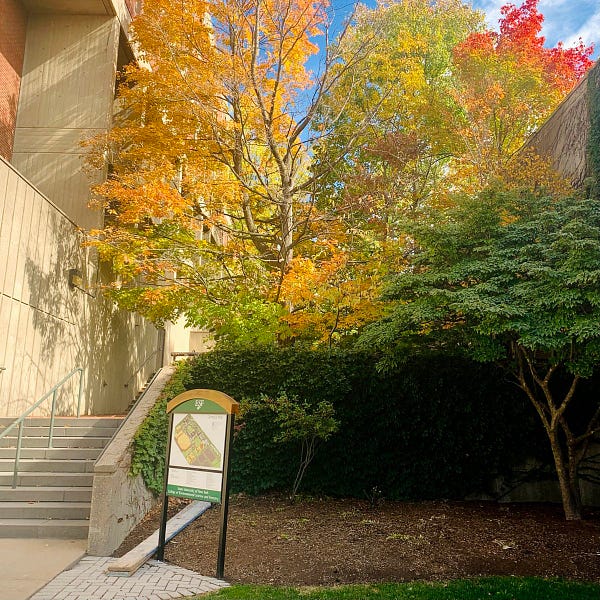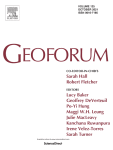🌿Wild Ones #52: Environmental Communication Digest
Environmental keyword: 'Climate Lyricism' + What we talk about when we talk about politics + Storying Climate Knowledge + more!

Hi everyone, welcome back to Wild Ones, a (typically) weekly digest by me, Gavin Lamb, about news, ideas, research, and tips in environmental communication. If you’re new, welcome! You can read more about why I started Wild Ones here. Sign up here to get these digests in your inbox:
🌱Environmental Keyword
‘Climate Lyricism’
A term coined by Min Hyoung Song in his new book Climate Lyricism, is:
“…a mode of address in which a first-person “I” speaks to a “you” about how climate change thoroughly shapes daily life. The relationship between “I” and “you” in this lyricism, Song contends, affects the ways readers comprehend the world, fostering a model of shared agency from which it can become possible to collectively and urgently respond to the catastrophe of our rapidly changing climate. In this way, climate lyricism helps to ameliorate the sense of being overwhelmed and feeling unable to do anything to combat climate change.” – From the summary of Climate Lyricism, Duke University Press.
Coming from a mostly sociolinguistics background, I’m not super familiar with the growing field of ecocritism, which seems to be exploding right now in literary studies. The field explores how writers of all kinds, from poets and musicians, to novelists and journalists, write about the environment.
On a side note, two books I’ve read that fall within this wide-ranging field that have stuck with me are Ursula Heise’s Imagining Extinction: The Cultural Meanings of Endangered Species. And Amitav Ghosh’s The Great Derangement: Climate Change and the Unthinkable.
Song casts a wide net for the kinds of poets and writers he includes as climate change writing. Even David Bowie makes an appearance!
This is because, as Song puts it, his idea of climate lyricism isn’t so much about asking how writers write about climate change (or other environmental issues). Instead, he says that “[r]eading their poetry and fiction (and listening to their songs) for climate change can act as a powerful mnemonic for attention”:
“Climate lyricism is also an attention to expression itself, to consider how innovations in speech, address, image, sound, and movement call forth shifting ways of apprehending a phenomenon that eludes familiar scales of comprehension.”
Song writes about his experience with what some are calling ‘climate anxiety’ beautifully in the first paragraph of his introduction. His aim is to find new ways to counteract the sense of powerlessness that creeps into our feelings and thoughts about the immensity of climate change. He does this, by first inviting us to think about our power in the world, our agency, not as an individual capacity, but as shared achievement between “you and I.” And it’s the notion of the lyric that reminds us of this you-I connection (at least that’s how I understand Song’s use of this environmental keyword before reading the whole book).
Interestingly, Song avoids using the pronoun “we” in his book. This is partly because, as he puts it:
“I write in the second person because I am asking, alongside the lyric, what you and I have in common…What kinds of shared futures can you and I imagine and bring into the realm of the possible, despite a highly organized investment in business as usual?”
Read the introduction to Song’s new book Climate Lyricism here (pdf).


📚 👀What I’m reading & watching
What we talk about when we talk about politics: A case for a new political language. By Anand Giridharadas in The Ink.


I’ve been a fan of Anand’s writing since I read his book, Winners Take All: The Elite Charade of Changing the World. The book doesn’t deal with environmental issues explicitly. But his analysis should be familiar to anyone who’s felt that corporate claims of advancing ‘sustainability’ or ‘green growth,’ while possibly doing some good on the surface, ultimately serve to advance the real goal: to enable ‘business-as-usual’ to continue.
If you haven’t seen it yet, I recommend watching the speech he gave in 2015 while a fellow with the Aspen Institute. Remembering his experience giving the speech, Anand writes at the end of Winners Take All:
“In the summer of 2015, I stood anxiously at a podium in Aspen, Colorado, wondering what happens when you tell a roomful of rich and powerful people that they are not the saviors they think they are…“I want to suggest,” I said that day from the podium, “that we may not always be the leaders we think we are.” I described what I called the Aspen Consensus: “The winners of our age must be challenged to do more good. But never, ever tell them to do less harm…”
🎧 What I’m listening to
Includes interviews with linguist Suzanne Romaine on “her recent research into language and sustainable development, and the links between the climate crisis and language death” and ecolinguist Mariana Roccia on the important role of ecolinguistics in language education.
“The Climate Connection is a 10-part series from the British Council exploring the connections between climate change and language education, and English language education in particular.
Here’s an interesting point Mariana Roccia made in the interview that stuck with me:
“TEFL [Teaching English as a foreign language] has had quite a history of being criticised for linguistic imperialism, and so being sensitive to the local culture and particularly how the other culture is representing ELT materials, such as coursebooks is really important, especially if those materials have been developed without consulting, you know, local experts or trying to incorporate the concerns that are around these communities. This has powerful effects because it can undermine the local ecological knowledge in exchange for what I think are perhaps more appealing aspirational values, which are quite often unsustainable, and continue to spread consumerist ideas which are not helpful in the long run. So going back to what we were talking about earlier, with a role that…large organisations play like, like the British Council, and how materials are created, incorporating these contents, and the values looking carefully at the values that are transmitted is crucial.”
Here’s a transcript of the interview and here’s a link to listen to it on Spotify:
🔍 Tools & Resources I’m exploring
UPROSE’s Tools for Achieving Climate Justice. About UPROSE: “Founded in 1966, UPROSE is Brooklyn's oldest Latino community-based organization…As lead advocates of climate justice, UPROSE views the just urban policy—ranging from transportation to open space—as the heart of climate adaptation and community resilience.”
The Green Fix. An informative and resource-filled newsletter on how to take action for climate justice. By Cass Hebron.
Climate Visuals, a Climate Outreach project, a new collaboration between Climate Visuals and TED Countdown:


📰 News, Events & Opportunities


From Yale Program on Climate Change Communication: Faith Communities Organizing for Climate Action. Webinar October 15th, 12pm EST (US).




📚 Research
Environmental Themes in Popular Narratives. By Miyase Christensen,Anna Åberg, Susanna Lidström & Katarina Larsen. In Environmental Communication (2018). (Free access!
Media Reform and the Climate Emergency: Rethinking Communication in the Struggle for a Sustainable Future. By David J. Park. Michigan University Press (2021).
Storying climate knowledge: Notes on experimental political ecology. By Dylan M.Harris in Geoforum (2021). Here’s an excerpt from Harris’s article I’m thinking about:
“…in light of increasing resistance to expert knowledge on topics like climate change, political ecologists should adopt more creative, experimental methods for building new forms of knowledge, especially in regions, and with people, key to issues central to our work. It is critical that these methods speak to and understand the context in which environmental knowledge is produced, understood, and acted upon…Storytelling, as a method used for both understanding context and envisioning the future, I believe is especially useful” (p. 332).


💡 Ideas
Rewilding is a two-way street: A letter from your neighborhood deer. By John Yunker in High Country News. On a side note, through his publishing company Ashland Creek Press co-founded with Midge Raymond, Yunker and Raymond have also published an interesting edited instructional volume on Writing for Animals, as well as courses on the topic too.
Social media is reducing climate change debates to your views on veganism. By Taha Yasseri and Mary Sanford in The Conversation UK.
The case for a more radical climate movement: Author Andreas Malm on the failures of climate activism and the need for escalation. By Sean Illing in Vox.
What do we mean by decolonizing conservation? By Mathew Bukhi Mabele (University of Dodoma, Tanzania), Laila Thomaz Sandroni (University of Sao Paulo, Brazil), Y Ariadne Collins (University of St. Andrews, UK) and June Rubis (University of Sydney, Australia).


💬 Quote I’m thinking about
“I want to find ways to democratize agency that break the spell of powerlessness, so that thinking about climate change emboldens rather than leads to a shrinking back.”
– Min Hyoung Song, in Climate Lyricism
Thanks so much as always for your interest in my work, and if you found this digest useful, please consider sharing with others who might find it interesting too😊 I'd also love to hear from you. Leave a comment to let me know what you think about this digest, what areas of environmental communication you’re involved in/most interest you, or anything you’d like to see more of in Wild Ones:)




Always looking forward to your newsletter! Feeling inspired every time :)
whoops, quite a few typos in this one! it's late:)